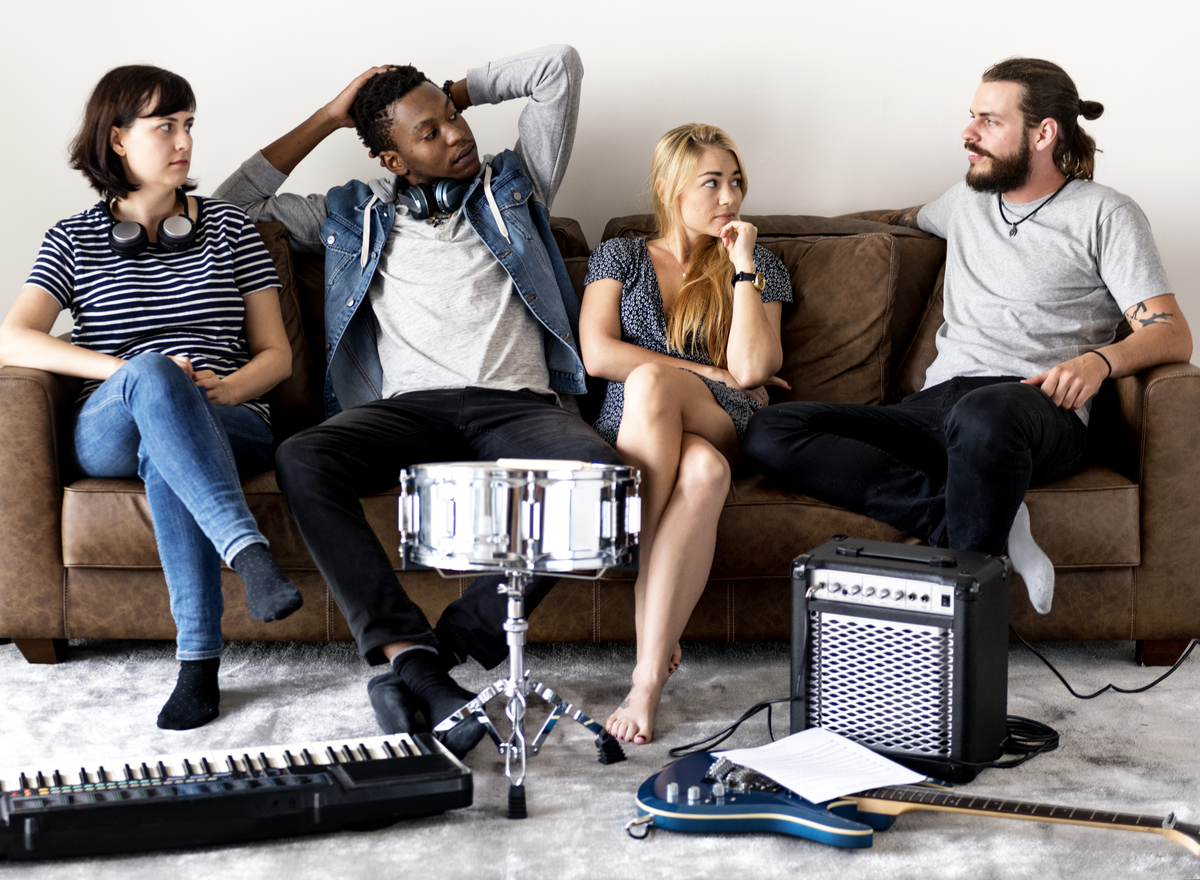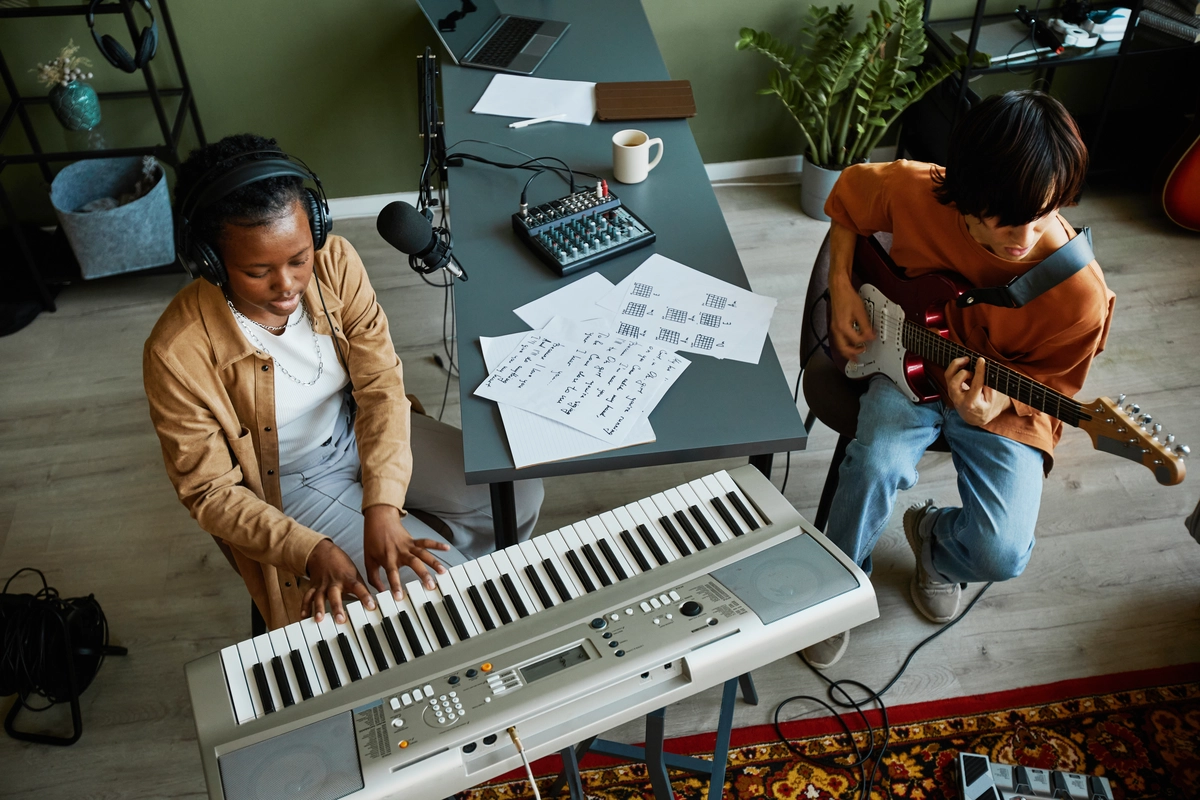How Is AI Being Used in Music Composition and Production?
One of the most fascinating uses of AI in music is generative composition. Through complex algorithms, AI analyzes vast amounts of musical data, from classical symphonies to modern hits. It learns the patterns, styles, and structures that define different genres and artists. Then, like a skilled apprentice, it crafts original compositions that echo the essence of these influences while adding its unique twist.

Moreover, AI is democratizing music creation. You don’t need years of training or expensive equipment to start making music. AI-powered tools allow anyone with a passion for music to experiment, create, and share their compositions with the world. From amateur musicians to seasoned professionals, AI is leveling the playing field and opening new avenues of expression.
In live performances, AI is making waves too. Imagine concerts where AI accompanies musicians in real-time, responding to their improvisations with harmonies and rhythms that complement their style. It’s a collaboration between human creativity and AI ingenuity, pushing the boundaries of what’s possible in live music.
As AI continues to evolve, so does its impact on music. The future promises even more exciting developments, from AI-driven virtual bands to personalized music recommendations that cater to individual tastes. Whether you’re a music lover, a creator, or simply curious about the intersection of art and technology, AI in music is a symphony of innovation worth exploring.
Harmony of Algorithms: AI’s Role in Revolutionizing Music Composition
Imagine AI as a maestro of algorithms, orchestrating melodies and harmonies that resonate with the soul. Unlike traditional composers who draw inspiration from emotions and experiences, AI learns from vast datasets of musical compositions spanning genres and eras. This deep learning process enables AI to discern patterns, structures, and styles, akin to a virtuoso studying the techniques of the masters.
One of AI’s remarkable abilities lies in its capacity to generate music autonomously, free from the constraints of human bias or fatigue. It can compose pieces that surprise and captivate listeners, pushing the boundaries of what was once thought possible. By analyzing the nuances of compositions, AI can create new works that evoke nostalgia, stir emotions, or challenge musical conventions.
Moreover, AI collaborates seamlessly with human composers, acting as a muse that offers novel insights and suggestions. It can enhance creativity by generating melodic variations, suggesting chord progressions, or experimenting with unconventional rhythms. This partnership between human ingenuity and AI’s computational prowess results in compositions that blend technical sophistication with artistic flair.
Critics may argue that AI lacks the emotional depth and spontaneity of human composers. Yet, proponents contend that AI enriches the creative process by offering fresh perspectives and pushing artists to explore uncharted musical territories. Imagine AI as a canvas where composers paint melodies with pixels of code, creating symphonies that resonate across cultures and generations.
As AI continues to evolve, its role in music composition will likely expand, challenging our perceptions of creativity and innovation. Whether it’s composing a cinematic soundtrack, a symphony for a grand concert hall, or a melodic backdrop for everyday life, AI is poised to leave an indelible mark on the musical landscape. So, embrace the harmony of algorithms and witness the transformative power of AI in revolutionizing music composition.
From Code to Composition: Exploring AI’s Creative Journey in Music
AI, or artificial intelligence, has opened new horizons in music creation by leveraging complex algorithms that mimic human creativity. These algorithms analyze vast datasets of musical compositions spanning genres and styles, learning the intricate patterns that define music. Through machine learning techniques, AI can predict musical sequences, harmonies, and even emotional nuances that resonate with listeners.
One of the most remarkable aspects of AI-generated music is its ability to blend familiarity with innovation. By understanding what makes music appealing to human ears, AI can compose pieces that sound both novel and authentic. It can seamlessly integrate elements from classical, jazz, rock, or electronic music into compositions that captivate diverse audiences.
Moreover, AI doesn’t just replicate existing music—it innovates. It pushes the boundaries of musical conventions by exploring unconventional rhythms, harmonies, and structures that might not occur naturally to human composers. This experimental approach challenges our perception of what music can be, offering fresh perspectives and pushing the creative envelope.
AI’s role in music extends beyond composition; it also enhances collaboration between humans and machines. Musicians and composers use AI tools to generate ideas, refine compositions, and explore new musical territories. This symbiotic relationship between human creativity and artificial intelligence fosters a dynamic creative process where innovation thrives.
As we delve deeper into AI’s creative journey in music, we uncover a landscape where technology and artistry converge. It sparks conversations about the nature of creativity itself—what it means to create, to innovate, and to express emotions through music. AI stands as a testament to human ingenuity, pushing us to explore new frontiers and redefine the possibilities of musical expression.
Virtual Maestros: How AI is Reshaping Music Production Studios
Have you ever wondered how your favorite songs come to life? Behind every mesmerizing melody and pulsating beat lies a world of creativity and technology converging in music production studios. Today, this world is undergoing a revolutionary transformation thanks to Artificial Intelligence (AI). AI isn’t just a buzzword anymore; it’s the virtual maestro reshaping the very foundations of music creation.
Imagine a virtual assistant that understands your musical preferences better than you do yourself. AI algorithms are now capable of analyzing vast amounts of data—from popular trends to niche genres—to predict what might become the next big hit. This predictive power allows producers and artists to fine-tune their creations with precision, ensuring that every note resonates with its intended audience.
But AI’s impact goes beyond prediction; it’s about enhancing creativity. In the past, musicians and producers relied heavily on their own instincts and experiences to craft a song. Now, AI tools can suggest chord progressions, melodies, and even entire arrangements based on the style and mood desired. It’s like having a limitless virtual collaborator who never runs out of innovative ideas.
Moreover, AI has democratized music production like never before. Gone are the days when expensive studio time and top-tier equipment were barriers to entry. Today, anyone with a laptop and AI-powered software can create professional-sounding tracks from the comfort of their home. This accessibility has led to a surge of diverse voices and sounds in the music industry, enriching our playlists with new perspectives and genres.
In the studio, AI serves as a versatile assistant, handling everything from audio mixing and mastering to real-time performance enhancements. Imagine correcting pitch imperfections or adjusting tempo effortlessly, all with a few clicks. This newfound efficiency allows artists to focus more on their creative expression and less on technical minutiae.
Furthermore, AI is pushing the boundaries of live performances. With AI-generated visuals synchronized to music, concerts have become immersive experiences where sound and sight harmonize seamlessly. Audience engagement reaches new heights as AI algorithms analyze crowd reactions in real-time, adjusting the performance dynamically to match the mood.
As we venture further into this AI-powered era of music production, one thing is clear: the possibilities are limitless. Whether you’re a seasoned producer or an aspiring artist, embracing AI means embracing a future where creativity knows no bounds. It’s not just about creating music; it’s about creating experiences that resonate deeply with listeners around the globe.
So, the next time you press play on your favorite track, take a moment to appreciate the invisible hand of AI guiding the melody. Behind every beat and harmony lies a digital maestro, orchestrating a symphony of innovation in the world of music production studios.
Beyond Beats: AI’s Impact on Melody and Songwriting
Traditionally, melodies were crafted by skilled musicians, drawing from their creativity and intuition. However, the landscape of songwriting is evolving, thanks to the incredible advancements in artificial intelligence (AI). Beyond just beats and rhythms, AI is now making its mark on melody creation in ways that were once unimaginable.
Imagine a world where a computer program analyzes millions of songs across genres and eras, learning the intricacies of what makes a melody timeless. This data isn’t just numbers and patterns—it’s the essence of musical expression distilled into algorithms that can compose melodies with stunning originality.
AI doesn’t replace human creativity; instead, it augments it. It’s like having a brilliant musical collaborator who can instantly suggest harmonies, counter-melodies, or even entirely new directions for a song. This partnership between human ingenuity and AI prowess is reshaping how melodies are born.
One of the most fascinating aspects of AI-generated melodies is their ability to surprise even seasoned musicians. They can blend influences from different genres seamlessly, creating hybrid melodies that defy conventional categorization. This versatility opens up new horizons for artists, enabling them to explore uncharted musical territories with confidence.
Moreover, AI isn’t just limited to melody creation—it’s also revolutionizing the way songs are structured. By analyzing patterns in popular music, AI can predict what chord progressions or song structures will resonate most with listeners, enhancing the overall appeal and impact of a composition.

Symphonies in Silico: AI’s Influence on Modern Music Creation
Imagine AI as a maestro with an array of digital instruments at its disposal, composing melodies that resonate with our emotions and transcend traditional genres. Unlike traditional composers, AI doesn’t have personal experiences or emotions, yet it can analyze vast amounts of musical data to create compositions that captivate and inspire.
One of the ultimate marvels of AI in music is its ability to learn and adapt. Like a musical savant, AI algorithms can study existing compositions across centuries, from Mozart to modern pop, and distill the essence of what makes music moving. It can then generate original pieces that blend familiar motifs with innovative twists, pushing the boundaries of creativity.
But how does AI actually compose music? It starts with algorithms trained on vast datasets of musical scores, chord progressions, and styles. These algorithms can mimic different composers or create entirely new styles. They learn patterns and structures, from the intricate harmonies of a classical symphony to the infectious rhythms of electronic dance music.
The impact of AI on music creation goes beyond mere composition. It extends to production, where AI tools help refine sound quality, mix tracks, and even suggest lyrics based on mood and theme. This blend of human creativity and AI precision opens doors to new possibilities, enabling musicians to experiment more boldly and connect with audiences on a deeper level.
In a world where technology continues to evolve at a dizzying pace, ‘Symphonies in Silico’ exemplifies the fusion of artistry and innovation. It challenges us to rethink what it means to create music and how technology can enhance our creative endeavors. As AI continues to refine its skills and expand its repertoire, the future of music promises to be as limitless as the imagination itself.
